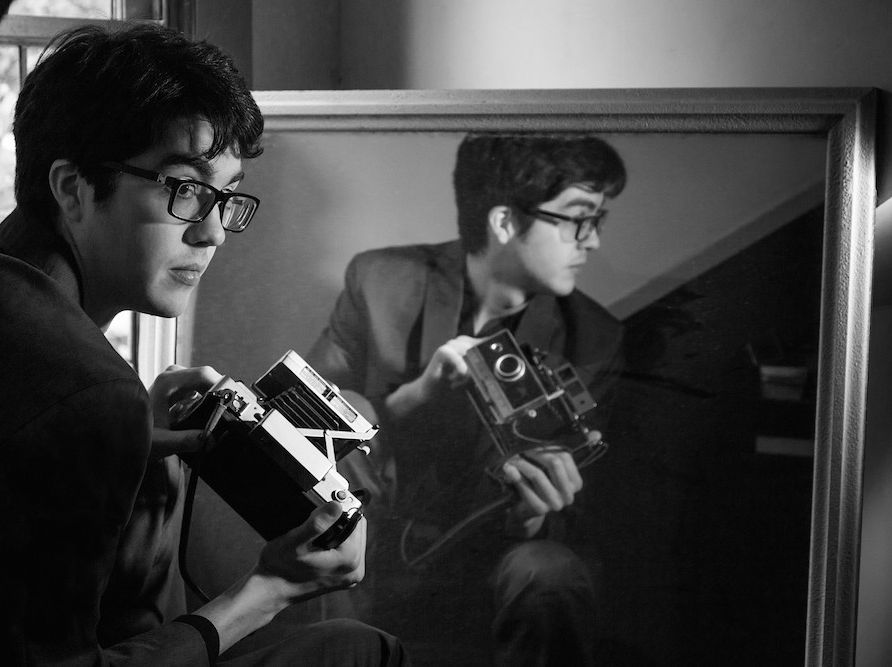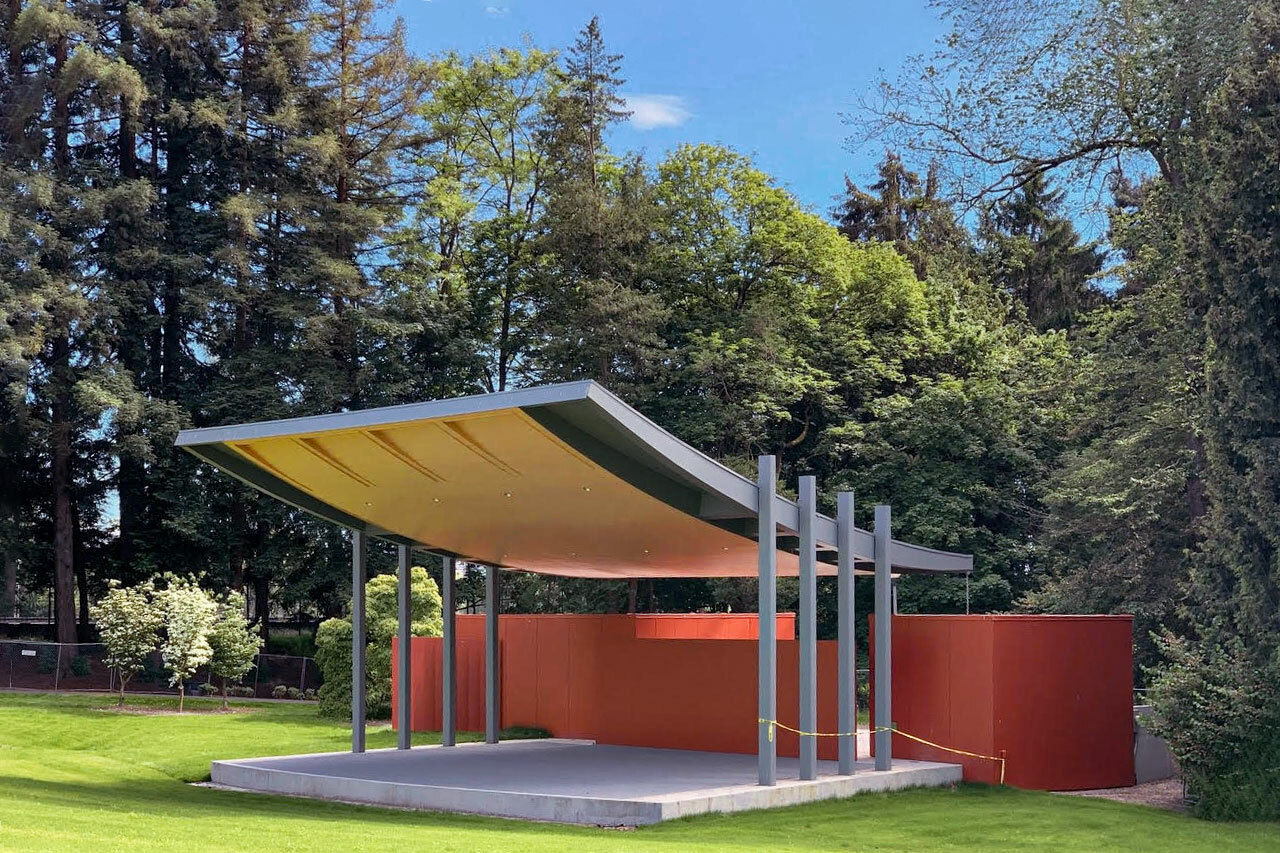A Fiendish Conversation with Car Seat Headrest

Car Seat Headrest's Will Toledo readies for his closeup.
Moving to Seattle to pursue a career in rock music isn't an uncommon path for ambitious 20-somethings. Most just don't break through as quickly post-move as Will Toledo (aka Car Seat Headrest). When Toledo completed his studies at Virginia Commonwealth University in 2014, he packed up and headed west to make a new home in Seattle (well... technically Kirkland). But unlike many, Toledo (thanks to rather prolific writing tendencies) came armed with quite the back catalog. Having self-released ten albums in a three year stretch between 2010 and 2013, Car Seat Headrest caught the attention of powerhouse indie label Matador Records.
After putting out a retrospective album of his reworked self-recordings on Matador last October (Teens of Style), Car Seat Headrest arrived as a force on the indie rock scene with the May release of Teens of Denial. It's a big, powerful, anthemic rock record that can also get tender, weird, and downtrodden. It's already been hailed as one best albums of 2016 by Rolling Stone, Pitchfork, Entertainment Weekly, and The A.V. Club. (And in your humble writer's opinion, "Drunk Drivers / Killer Whales" is the best song released in 2016 to date.) After extensive touring in Europe and around the states, Car Seat Headrest returns home to play the Capitol Hill Block Party main stage this Saturday.
For our latest Fiendish Conversation, we chatted with Toledo about Teens of Denial's breakout success, awesome Portuguese fans, and his decision to move to Seattle.
With Teens of Denial having been released for a few months now, what aspects of the album—of this collection of songs—are you currently finding most enjoyable and exciting?
I think what excites me about the album is its durability on the road. I think they’re a pretty sturdy batch of songs. I intended them to be songs that we could take out on the road and play night after night, and it has worked out. Before we started playing these songs, we were doing older work and we’d usually kind of rework those songs continuously to try and keep it fresh. But with these songs, it kind of feels like we don’t have to rework them so often. We’ve kind of got into a groove with a lot of them where we can still be energetic without reconstructing them in new ways. It’s just fun to play it the same way and focus more on really nailing everything and making it better every night.
Did you take a different approach to writing this album knowing it would be released on Matador Records, as opposed to the previous self-released ones?
Well, I actually wrote almost all of it before the deal with Matador was on the table.
But I did write it with an intent. It was my last year in college when I started writing, and I knew that I wanted to make this into a career. So I wrote it in a way where I kinda figured I’d be able to get into a studio at some point to record it, and that I’d be able to have a band to take it on tour. So it was just lucky that it did end up happening that way. By the time I had it mostly finished, Matador came along and we were able to get into the studio to do that.
So then after graduating college, why did you choose to move to Seattle?
I had a friend who lived here—I’m actually still in the same house where I originally moved out to after college. It was just a matter of needing a place to stay and having one here. I knew that I didn’t want to stay in Virginia, there wasn’t much to do musically there, and I knew that Seattle was known for its music. And I knew that I wanted to do this professionally, so it seemed like a good balance of things.
I’m living out in Kirkland. When I first moved out here, I wasn’t sure that I wanted to be right in the city. I’ll probably actually move soon to be closer to the city, just ‘cause that’s where we practice, but at the time it seemed like a good balance of being near a metropolitan center but not right in the middle of it.
Do you feel like Seattle has influenced your music at all during your relatively short time living here?
I think that working with [Teens of Denial producer] Steve Fisk did. He kind of gave us a short term course in Seattle music history. Working with him was definitely the right choice. I knew that I wanted to do it with someone here just so we wouldn’t have to fly out somewhere to record the record. He’s been here for so long, and has had so much experience with the scene, that I think it kind of put us into the local culture in a way. With me having moved here just a couple years ago, if we hadn’t worked with him, we wouldn’t necessarily feel like a Seattle band so much. But now we’ve sort of got at least a little bit of local flavor to us.
That’s one of the things I’ve noticed during this breakout of yours is that lots of people still haven’t registered that Car Seat Headrest is a Seattle band.
I can understand not registering us as a Seattle band. I think it’s fair if people don’t do that because we haven’t been here too long. None of us are actually from Seattle. Well, [bassist] Ethan [Ives] is from somewhere else in Washington—one of the smaller local towns way out somewhere in the middle of nowhere—but the rest of us just came here for music.
I feel like Teens of Denial might be the most Seattle record that we do, in terms of doing it very locally. We might branch out a bit for the next record. But people for the most part have been very welcoming and every time we do a show here, it’s a very positive response and mostly a whole lot of people show up. So I’ve been happy with that.
Yeah, I was at a Chuck Klosterman book reading at Elliott Bay Book Company recently and during the Q&A he mentioned that Teens of Denial might be the best rock record since the Hold Steady’s Separation Sunday [in 2005]. And someone in the crowd yelled out, “They’re a Seattle band.” And both the Klosterman and the majority of the audience seemed totally surprised by that fact. I guess it’s one of those rare things where you’re bigger in national and some international markets than you are in your de facto hometown, which is always kind of strange.
Yeah, I’m kind of used to that just cause of the way Car Seat Headrest came up as kind of an online project. There was you know there was no idea of a local thing that it was attached to. And in retrospect, after I left Virginia and started coming back for shows, it definitely felt like there was sort of a legacy there. Like oh, Car Seat Headrest started here. But I don think it’s ever been super attached to any one place. With the way that people find out about it through internet sources rather than local sources, it makes sense that it wouldn’t register in that way.
Right. There’s no geography on the internet.
So having written Teens of Denial with the intent for it to fully launch music as your post-grad career, are you at all surprised by how much it’s taken off and the massive level of positive critical response it’s received?
Yeah, I mean its been a very gratifying experience. Coming up, I was working in relative obscurity for years, and I’d always hoped that it would catch fire at some point. But by the time it did start catching fire, I’d been working slowly for so long that it was very surprising to see that it really could happen like that—that it could go from 0 to 60 in about a year. I mean, there’s nothing quite like it, to see it really take off like that.
Now that you’ve had a little time to digest it all, is there anything specific about these songs that you think has led them to connect in such an instant way?
I think it was very, very good timing with everything. Like I said, from the start this record was designed to be one of my most accessible albums. When you’re working, sometimes you know this will be a smaller project or this will be a big project, and I knew from the start I wanted this to be a big album. And then it just so happened that one of the biggest indie labels came along right when I was getting ready to record it. Then they were able to take the momentum that I’ve been putting into it—into that specific album for two years and into Car Seat Headrest for five years—and really spread it on an international level. It was just sort of the sort of thing where people just got excited about it, and the more people are talking about it, the more people get excited about it. I’d been hoping for a while that something like that would happen, and finally it did.
One of the things that sticks out to me about your songwriting is how you write really interesting little segments of songs. They sometimes feel kind of uniquely pieced together from somewhat different parts, rather than a more traditional song flow. Kind of like how “Drunk Drivers / Killer Whales” pivots near the end to this bigger anthemic song. Is that just a product of your own writing flow, or is it a thing where you write a bunch of separate, disparate parts and then sort of piece them together latter?
Yeah, most of the time it is different parts coming together. Although I think with
“Drunk Drivers,” the whole shape of it was kind of in one go. But usually when it sounds segmented, it is because they have different origins and then at some point in the creative process I fit together. I don’t usually write songs in one go. I try and let them build up over time so they can have as much space to grow as they need.
Outside of the album’s release, have there been any specific highlights that have stuck out from the whirlwind of the past few months?
Well we just got back from a European tour. And playing Primavera Porto and Barcelona… those were really spectacular shows. The crowds were just huge and it was just far beyond anything we’d ever played to before. And not only that, but they were just so into it. In Porto, after we finished our set they were still singing along to the last song. It was just really incredible experience, and it felt like whatever had been building up, we’d finally arrived there.
Weirdly enough, I actually just watching video of the Porto set on YouTube yesterday. That crowd was amazing. Singing along and just so engaged. I wish more U.S. audiences were like that more of the time.
Yeah, it was a very special occasion.
Is there anything in particular that you’re looking forward to about playing Capitol Hill Block Party?
It will be good to play Seattle again. It feels like it’s been a long time since we’ve done a local show, you know? There’s definitely a certain sort of flavor to a show when you can see a bunch of people you know. And if nothing else, it’s nice to just drive 30 minutes after the show and be back home.
Capitol Hill Block Party
July 22–24, Capitol Hill, $50–$60; Festival pass $150–$300




